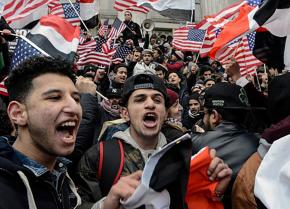Bodega owners against the ban
reports on the mobilization of Yemeni storeowners against Trump's ban.
DAYS AFTER New York City cab drivers held a one-hour work stoppage at a New York airport to protest Donald Trump's ban on travelers from seven Muslim-majority countries, Yemeni storeowners held their own strike, shutting their doors to protest the racist order.
Many grocery stores and delis--known as "bodegas" by New Yorkers--across the city's five boroughs are owned and operated by Yemeni immigrants. Yemen is one of the seven countries effected by Trump's executive order. The Yemeni American Coalition, Yemeni American Association and other groups called for the eight-hour shutdown, which spread like wildfire through social media and word of mouth.
After the morning coffee and bagel rush on Thursday, February 2, more than 1,000 Yemeni small business owners closed their stores to join the citywide strike against the executive order. Throughout the morning and afternoon, many made their way to Brooklyn's Borough Hall, where the crowd had swelled to 5,000 by evening.
Chanting in English and Arabic and carrying signs such as "No ban, no wall" (in opposition as well to Trump's proposed wall along the U.S.-Mexico border), the largely Yemeni crowd rallied for hours into the evening as they were joined by students, Black Lives Matter activists, and other supporters.

February 2 was also the five-year anniversary of the death of Ramarley Graham, an 18-year-old Black man killed by New York police officer Richard Haste. Hundreds of protesters who had gathered to commemorate Graham's death and call for the firing of Haste marched from Manhattan over the Brooklyn Bridge and joined the bodega owners in a show of solidarity.
WHILE YEMENI educators, community activists and city politicians spoke from the front, a group of Muslim high school girls in hijabs and niqabs electrified the crowd as they led chants of "Don't give in to racist fears, refugees are welcome here!" and "Build the wall, and we'll tear it down!" Yemeni store owners posed for selfies with teachers who carried signs reading, "I love my Yemeni students."
Nasser Alsubai, whose family owns Yemen Cafe on 5th Avenue in Bay Ridge, Brooklyn's largest Yemeni neighborhood, closed his popular restaurant for the day to attend the rally. Alsubai said that organizers of the shutdown and rally contacted him and dropped off flyers at his restaurant, which serves as a social space for many in Bay Ridge's Yemeni community to get together and share information.
Asked if he was concerned about losing money with his business closed for the day, Alsubai replied, "It's a loss when you give up on your hope, when you give up on your rights, when you give up on yourself, when you give up on your people."
Alsubai likened the attacks against Muslims to those on other historically oppressed groups in the United States, like African Americans. "It's our obligation to go out there and fight," he said. "It's not something we're supposed to tolerate and go along with."
A group of teachers from Khalil Gibran International Academy High School (KGIA) in Brooklyn walked to the rally after school. KGIA has a predominantly Yemeni student population. Many students there have been impacted by Trump's ban.
"This executive order has far-reaching effects on our students' families," said KGIA teacher Amanda Berthelot. Berthelot said she went to the rally because it's "important to me that the students know we stand with them as a school community."
The teachers were discussing plans on February 1 for a day of solidarity with their students when they heard about the rally planned for the following day. They quickly organized at their school to join students, many of whom attended the rally with their families after closing their stores for the day.
THE FEBRUARY 2 strike and rally is only the latest reaction to President Trump's racist attacks. Hundreds of Muslims and non-Muslims marched January 16 in the Martin Luther King Jr. Day March Against Hate in the predominantly Muslim neighborhood of Bay Ridge in Brooklyn. Five days later, more than 400,000 marched through Manhattan for the Women's March held in New York City, along with mass protests in Washington, D.C., and around the country.
Since issuing the executive order on January 27, 2017, thousands more have rallied across New York, including the inspiring protest at New York City's John F. Kennedy International Airport on January 28.
Unlike many of the other protests, which were noticeably non-Muslim, the February 1 rally was majority Muslim, with many proudly wearing the traditional Yemeni imamah (head scarf) and waving Yemen's flag. Many also waved American flags.
According to Alsubai, the JFK protests gave his community the confidence to call their own action. Too often in the past, he explained, many Arab Muslims in New York were afraid to speak up. Not having a mastery of English, not knowing their rights and not knowing if speaking out could put them in jeopardy froze many of them in a state of fear.
But seeing the protests at JFK airport gave them the confidence to act. "When they saw [the airport protests], it gave them that extra sense to say, 'Hey, you know what, we need to go out there,'" said Alsubai.
The judicial ruling halting enforcement of Trump's travel ban is a victory for immigrants and their supporters, but we must keep up the pressure and not rely just on the courts. We must build solidarity between Muslims and non-Muslims alike and stand shoulder-to-shoulder to defeat Trump.


